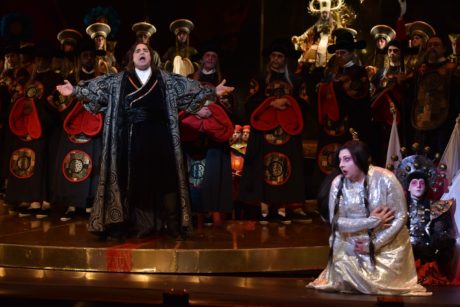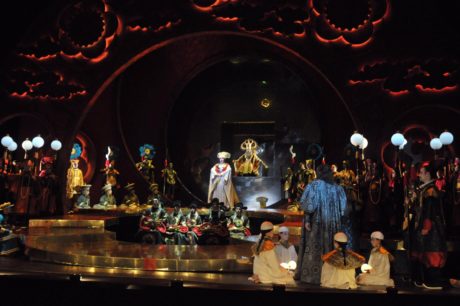Danger and darkness lurk around every corner of Opera Philadelphia’s stunning new production of Turandot, a co-production with Minnesota Opera, Cincinnati Opera, Pittsburgh Opera, Utah Opera, and Seattle Opera. Directed by Renaud Doucet and led by Conductor Corrado Rovaris, this hypnotizing ancient tale creates an intense blend of love and death with a few small touches of comedy. Giacomo Puccini’s legendary score, with a libretto by Giuseppe Adami and Renato Simoni, comes to life with an epic ensemble, stunning leads, and a reimagined aesthetic that’s fit for an emperor.
Disrupting the palace life in Peking, China, Princess Turandot has decreed that she refuses to marry a suitor unless he is of noble blood and able to answer three riddles. If he cannot, he will suffer beheading. As the people await the death an unsuccessful young suitor, the blind and exiled ruler Timur is reunited with his son Calaf with the help of Liu, Timur’s devoted servant suffering from a long-unrequited love of Calaf. Troubled by the scene at the palace but hopelessly entranced by the beauty of the majestic Turandot, Calaf declares he wishes to complete the challenge for Turandot’s hand and risk his life.
Using all of Act One to establish, this premise begins what is a fairly uncomplicated conceit as compared to other stories in this era. Observing the ancient unities in classical style, the action is resolved in one day and in one location with little to no use of subplot. Nevertheless, Turandot explores emotions on a universal scale through love, loss, justice, fear, and death.
Calaf has declared his intention for Turandot, while withholding his name for fear of the repercussions of his family’s exile. As the heartbroken Liu, soprano Joyce El-Khoury pleads with him in “Signore, ascolta!” full of desperate pain and high ghostly notes so delicate they almost seem to disappear into the air. While still considered a supporting character, Liu remains a musical focus of the piece and becomes the tragic heroine, brilliantly handled by El-Khoury in “Tu che di gel sei cinta” as she makes her final sacrifice.
Contrasting Liu’s demure and devoted servitude, soprano Christine Goerke plays Turandot robustly with a cold, looming power that melts into a fragile and frightened pleading. As she explains in “In questa reggia,” she uses the challenge of the riddles and resulting beheadings as revenge for her ancestress who was captured, raped, and put to death by invaders. By reaching marriageable age, she has constructed an imperial system of pain and death to achieve some small amount of justice for the wrongs brought on her family.

It is only Calaf, calling himself the Unknown Prince, who is able to destroy the walls Turandot has built to protect herself, creating a fury in the kingdom as they attempt to discover his name at the command of Princess Turandot. Sung with a stalwart and majestic heroism by tenor Marco Berti, Calaf accompanies this sleepless night with Turandot’s most famous but all too brief aria, “Nessun dorma.” A haunting but triumphant melody by Puccini, Berti’s soaring tone launches it into the stratosphere as the production’s high point. Completing the stellar quartet of tragic characters, Morris Robinson as Timur has an enveloping, warm bass sound, which is featured nicely in contrast to both Calaf and Liu.
Providing all of the comic relief in delicious morsels are Ping, Pang, and Pong (Daniel Belcher, Julius Ahn, and Joseph Gaines respectively). As the clowns of the piece, these three also bring an air of world-weariness and wisdom, combining in their style to become a sort of tramp to the darkly intense tale. They wear robes and tassels as you might expect from a traditional telling, but also natty hats and spats in an almost fluorescent palette.
Set in an imagined Chinese location, much of what Puccini has created in Turandot is an exoticized and sometimes troubling portrayal of China over the years, not the least of which can be seen in the names of the three clowns. This production pays homage to it’s Chinese lineage, with a nod to the Western cultures that the story trickled down through in order to reach Puccini, while creating a more symbolic cultural idea in its aesthetic.

With set and costume design by Andre Barbe, the visual story featuring mostly deep golds, reds, and black, also incorporates countless circular motifs symbolizing the cycle of life and death as well as the threatening presence of some of the souls already victim of Turandot’s plot.
Lighting design by Guy Simard delves deep into the murky corners of this dark fairy tale, as well as featuring the presence of the round metallic moon or the life-threatening gong. The huge chorus of singers, dancers, and children not only fill the stage with a stately presence, but also bring into sharp focus the effects of the dangerous royal decrees on the people of the kingdom, another musical focus of the score.
Turandot is by all means a less conventional version of the “love conquers all” allegory we have come to accept. Deeply rooted in the threat of death and violence, it is simplistic in its approach, making it perfectly accessible for both the aficionado and the beginner. The poetry is descriptive but never flowery, sidestepping the effusiveness that can tend to cloud an opera experience. With touches of comedy as well as an epic display of love and loss, Turandot is an intense but essential piece of the repertoire, and meaningful for all types of audiences. I highly recommend Opera Philadelphia’s beautiful production of Turandot.
Running Time: Two hours and 40 minutes, with two intermissions.
Turandot plays through October 2, 2016 at Opera Philadelphia, performing at the Academy of Music – 240 South Broad Street in Philadelphia, PA. For tickets call (215) 732-8400, or purchase them online.




